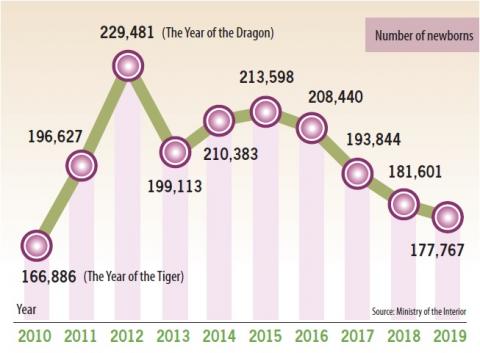Just 177,767 children were born in Taiwan last year, a record low for the decade, with the exception of 2010, when 166,886 were born, Ministry of the Interior statistics showed.
However, an annual decrease in the number of births has been slowing in recent years, likely due to the childcare subsidies introduced by the government, or the belief that children born in a Year of the Pig, which last year was, would be blessed with better luck, Awakening Foundation director of policy Chyn Yu-rung (覃玉蓉) said on Sunday.
Like 2010, 2022 will be a Year of the Tiger in the 12-year cycle of animals on the Chinese zodiac.

Doctors said that the birthrate could hit a new low that year, as many women usually try to avoid giving birth during tiger years for superstitious reasons.
Taiwanese often try to time their children according to the zodiac years, and believers of folk religions think that children born in the Year of the Tiger would have a more rugged and bumpy path in life, which is why 2010 saw so few births for the decade, Taiwan Association of Obstetrics and Gynecology secretary-general Huang Min-chao (黃閔照) said.
The government should adopt early preventive measures, such as having celebrities who were born in a Year of the Tiger share their experiences as a way of helping eradicate stereotypes, he said.
However, the number of childbirths this year could hit a new low, because the number of women of childbearing age — from 15 to 49 years old — is also decreasing, Huang said.
The government should make more efforts to create family-friendly workplaces, because many Taiwanese postpone parenthood for financial reasons or due to workplace discrimination against pregnant women, he said.
However, women who wait until the age 37 or 38, when their financial situation is better, might encounter age-related infertility issues, Huang said.
Even though childcare subsidies help ease the financial burden on parents, many parents are still concerned about the number and quality of childcare institutions and private babysitters, Chyn said.
The government should also increase its efforts to oversee such caregiving services, she added.

South Korean K-pop girl group Blackpink are to make Kaohsiung the first stop on their Asia tour when they perform at Kaohsiung National Stadium on Oct. 18 and 19, the event organizer said yesterday. The upcoming performances will also make Blackpink the first girl group ever to perform twice at the stadium. It will be the group’s third visit to Taiwan to stage a concert. The last time Blackpink held a concert in the city was in March 2023. Their first concert in Taiwan was on March 3, 2019, at NTSU Arena (Linkou Arena). The group’s 2022-2023 “Born Pink” tour set a

CPBL players, cheerleaders and officials pose at a news conference in Taipei yesterday announcing the upcoming All-Star Game. This year’s CPBL All-Star Weekend is to be held at the Taipei Dome on July 19 and 20.

The Taiwan High Court yesterday upheld a lower court’s decision that ruled in favor of former president Tsai Ing-wen (蔡英文) regarding the legitimacy of her doctoral degree. The issue surrounding Tsai’s academic credentials was raised by former political talk show host Dennis Peng (彭文正) in a Facebook post in June 2019, when Tsai was seeking re-election. Peng has repeatedly accused Tsai of never completing her doctoral dissertation to get a doctoral degree in law from the London School of Economics and Political Science (LSE) in 1984. He subsequently filed a declaratory action charging that

The Hualien Branch of the High Court today sentenced the main suspect in the 2021 fatal derailment of the Taroko Express to 12 years and six months in jail in the second trial of the suspect for his role in Taiwan’s deadliest train crash. Lee Yi-hsiang (李義祥), the driver of a crane truck that fell onto the tracks and which the the Taiwan Railways Administration's (TRA) train crashed into in an accident that killed 49 people and injured 200, was sentenced to seven years and 10 months in the first trial by the Hualien District Court in 2022. Hoa Van Hao, a